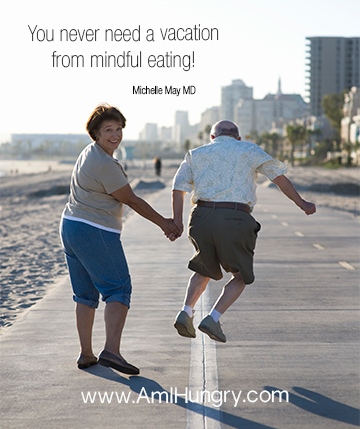
We are a mobile society and whether traveling for leisure or work, eating on the road presents myriad challenges. Some examples:
- The vacation mindset may lead to overeating.
- Finding a great balance of nutritious and delicious snacks and meals away from home.
- Frequent opportunities to have foods you don't typically eat.
- Rushing through airports with little time to sit down and enjoy a meal mindfully.
- Unpredictable meal times.
- Eating food preventively in case a flight is delayed or you can't find suitable food.
- Dinner and drinks with clients or family and friends.
- Room service alone.
- Stress or boredom during time spent in airports, long flights, hotels, or endless miles in the car.
Any of these challenges can lead to choices about when, what, and how much to eat that leave you feeling stuffed, tired, and regretful. Mindful eating provides a simple approach that's flexible enough to withstand the challenges of eating while traveling.
Let's start with the basics. Mindfulness is simply paying attention to the present moment, on purpose, without judgment. It is an ancient practice with profound and practical applications in modern society. Mindfulness is finding its way into many aspects of our work and personal lives. At Am I Hungry? Mindful Eating Programs and Training, we've used mindful eating principles for the last seventeen years to help clients and employees resolve reactive, habitual, and mindless eating patterns that lead to short and long term problems.
Nine Mindful Eating Tips for Travelers
- First, check your fuel gauge. You wouldn't pull into a gas station to fill up without first checking your fuel gauge. But how often do you eat just because it's there? To recognize the difference between wanting to eat and needing to eat, pause and ask, "Am I hungry?" You may be surprised to notice how often you feel like eating just because you're bored, tired, stressed, or want a reward.
- Set your intention. Obviously, before you leave on your trip, you decide where you're going, right? Before you start eating, decide where you want to end up. Having a clear intention to feel good when you're done eating will guide your choices. (For more about how to shift from a Vacation Mindset to a Mindful Eating on Vacation mindset, read Mindful Eating on Vacation.)
- Eat what you love. Rigid dietary rules are difficult to sustain under the best of circumstances. Restriction often triggers deprivation, cravings, overeating, and guilt so you may find yourself in a trap I call the "eat-repent-repeat" cycle. When guilt is no longer a factor, common sense will prevail.
- Use nutrition information as a tool, not a weapon. All foods can fit into a healthy diet while traveling when you follow the simple principles of balance, variety, and moderation. Balance eating for enjoyment with eating for nourishment; choose a variety of foods to feel healthy and satisfied; and practice moderation in all things.
- Be prepared. Keep nutrient-rich foods on hand for snacks or meals to lessen preventive eating and the fear of becoming hungry at an inconvenient time. Here are some delicious, nutritious examples: Water; fresh or dried fruit; nuts or trail mix; whole grain crackers with nut butter (peanut, almond) or string cheese; pouches of ready-to-eat tuna; packets of oatmeal; instant soup; granola or protein bars; and individually wrapped squares of dark chocolate for those times when only chocolate will do!
- Make eating an opportunity to refuel and recharge. The ability to multitask is a myth; your brain can only focus fully on one thing at a time so everything else goes on automatic, especially eating. Take a break and enjoy your food.
- Make eating a sensuous experience. Give eating your full attention for a multi-sensory experience. Minimize distractions, pay attention to your hunger and fullness cues, and appreciate the aromas, appearance, and flavors of the meal. New foods eaten in novel environments enhance the experience!
- Practice self-care. We've all come home from a business trip or even a vacation feeling exhausted. While on the road, self-care is not an indulgence, it is a necessity. The little things--restful sleep, drinking plenty of water and moderating alcohol, connecting with family and friends, making time for physical activity, and quiet relaxation--all contribute to your enjoyment and effectiveness.
- Live mindfully too. Traveling, even for work, offers many new opportunities to practice mindfulness. Whether sight-seeing, people watching, working, or relaxing, becoming aware of the present moment without judgment releases much of the stress and distraction that gets in the way during our daily lives.
Michelle May, M.D. is a recovered yoyo dieter and the founder of Am I Hungry?® Mindful Eating Programs and Training that guides individuals to resolve mindless and emotional eating and senseless yo-yo dieting to live the vibrant life they crave. Over 600 health professionals have been trained to facilitate Am I Hungry? Programs worldwide. Dr. May is also the award-winning author of the book series, Eat What You Love, Love What You Eat.
-- This feed and its contents are the property of The Huffington Post, and use is subject to our terms. It may be used for personal consumption, but may not be distributed on a website.
No comments:
Post a Comment